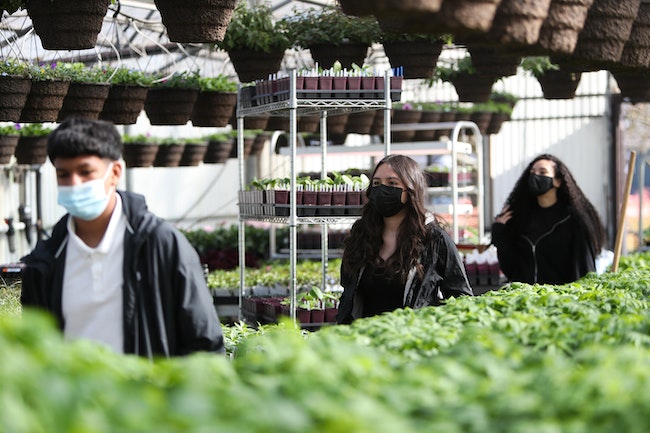
Josue Castaneda, Margarita Arroyo, and Nevaeh Okell tour through the greenhouse as part of their ‘Introduction to Agriculture’ class at McKay High School on Tuesday, April 13, 2021. (Amanda Loman/Salem Reporter)
When her high school moved classes online last year, Kaydance Sabin, 16, said gardening helped her deal with the stress and social isolation.
She grew cucumbers, strawberries and tomatoes at her family’s Salem house.
“It just takes your mind off so much,” Sabin said. “I could just be out there listening to music and doing yard work for hours without realizing it.”
Now, Sabin, 16, and her classmate Lillianne Benson, 17, are back in the McKay High School greenhouse getting ready for their biggest event of the year: the plant sale that provides the bulk of funding for Salem-Keizer’s only Future Farmers of America chapter.
The greenhouse on the south edge of the school is overflowing with more than 10,000 plants and starts destined for gardens and nurseries around Salem. To date, more than 6,000 plants have been sold, and 11,000 more still await purchase, agriculture teacher Gerald Hosler said.
“We usually overplant things. We’ll have more things than we probably ever need,” he said.
Plant sales are open online and purchases can be picked up starting in May. Hosler said sales will run through the end of May or until all plants are sold, with remaining plants to be donated to Marion Polk Food Share, local elementary schools and other community groups.
Sales are up from prior years, with about $11,000 grossed to date.
 The greenhouse at McKay High School on Tuesday, April 13, 2021. (Amanda Loman/Salem Reporter)
The greenhouse at McKay High School on Tuesday, April 13, 2021. (Amanda Loman/Salem Reporter)
Hosler suspects that’s because the sale is becoming better known, and because of an increase in gardening as more people stayed home during the pandemic and looked for hobbies that didn’t require gathering in groups.
Students typically raise the plants from seed, working in agriculture classes offered at school, and outside of school hours as part of FFA. This year, Hosler said they relied more on plugs because school was still online when preparations began for the sale in December and January.
Students helped with sale preparation and transplanting in small groups. Now, the greenhouse is crowded with everything from tomato and cauliflower starts to pots of flowers and herbs.
“Kids still have that experience of the transplanting and looking at plant nutrition,” he said.
The proceeds cover the cost of entering competitions, travel and membership for FFA students. Hosler, who restarted the district’s FFA program in 2015, said he didn’t want cost to be a barrier for anyone interested in participating.
 Gerald Hosler, agriculture teacher, gives a tour of the greenhouse to students in the ‘Introduction to Agriculture’ class at McKay High School on Tuesday, April 13, 2021. (Amanda Loman/Salem Reporter)
Gerald Hosler, agriculture teacher, gives a tour of the greenhouse to students in the ‘Introduction to Agriculture’ class at McKay High School on Tuesday, April 13, 2021. (Amanda Loman/Salem Reporter)
Benson joined FFA in 8th grade because her mother told her she could get more rescue llamas if she showed them at FFA and 4H events locally.
She’s been raising llamas since 4th grade, helping care for a herd of about 17 animals on her grandmother’s property outside Salem. Most have food-inspired names: Wonton, Poptart and Cocoa Butter.
“I stayed because it’s a lot better than normal school,” Benson said of her agriculture classes. “You get to do stuff that actually benefits real life.”
That includes skills like practice job interviewing as part of the FFA club, she said.
Sabin grew up raising chickens on a family home in Aurora before moving to Salem.
Before school closed last spring, the pair said they often spent time at the school greenhouse, which serves as a social hub for agriculture students. Spring break was consumed by transplanting starts.
Like Sabin, Benson said raising plants and animals helped her get through the past year as her family planned a re-do of her grandmother’s garden.
“It’s a way to meditate without doing absolutely nothing,” Benson said.
When in-person classes resumed earlier this year, the pair said the school greenhouses were overgrown, full of maturing starts.
Benson, Sabin and their classmates are preparing for shifts loading flats of starts into waiting cars. They’re expecting a busy May with the higher volume of plant sales.
“It’s a lot more than we’ve done. We definitely need to clean out the greenhouse,” Benson said.
Contact reporter Rachel Alexander: [email protected] or 503-575-1241.
BE PART OF OUR TEAM FOR SALEM’S BENEFIT: Accurate local information is vital for any community and that’s harder to come by in this day of “anyone can post anything” to social media. People in communities without trained journalists working for them don’t have accurate, trusted information. Help Salem avoid that fate – join in putting fuel in the tank of Salem Reporter to keep it growing, going strong. Here’s how:
SUBSCRIBE: A monthly digital subscription starts at $5 a month.
GIFT: Give someone you know a subscription.
ONE-TIME PAYMENT: Contribute any amount and you support giving the people of Salem local news otherwise missing. (You can also mail your contribution: Salem Reporter, 72585 Middle Fork Lane, Bates OR 97817)

Rachel Alexander is Salem Reporter’s managing editor. She joined Salem Reporter when it was founded in 2018 and covers city news, education, nonprofits and a little bit of everything else. She’s been a journalist in Oregon and Washington for a decade. Outside of work, she’s a skater and board member with Salem’s Cherry City Roller Derby and can often be found with her nose buried in a book.









